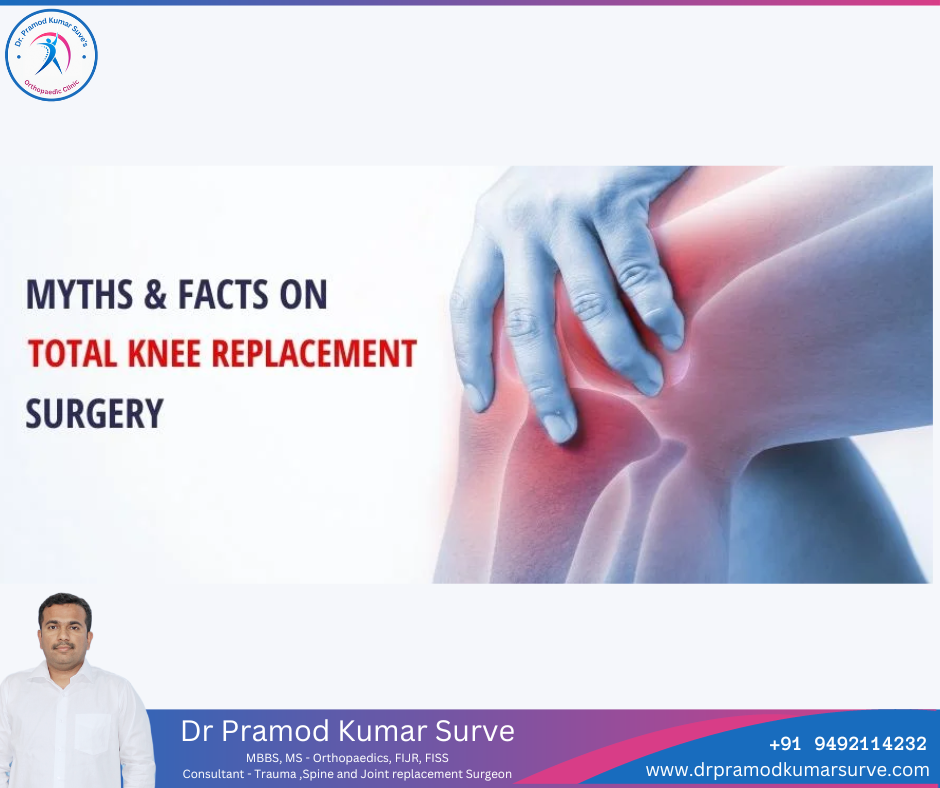Hearing that total knee replacement surgery is the only way to restore your health often petrifies patients. But it is the best surgical treatment to replace the diseased knee joint with an efficiently working artificial knee joint.
However, it becomes far scarier due to the misconceptions associated with it. All the myths prevailing regarding total knee replacement surgery prevent patients from exploring this treatment option.
So, to help you make a wise decision, we debunk the most prevalent myths and provide you with knee replacement facts instead. But before we dive into busting the myths, let’s have a quick overview of total knee replacement.
What is a total knee replacement?
Total knee replacement refers to a surgical treatment performed by surgeons to replace the diseased knee joint with an artificial knee joint. Under this procedure, metal implants are introduced into the body that replace the damaged cartilage and bone to restore joint movement effectively.
With advancements in the medical field, hospitals are opting for the robotic knee replacement technique, which uses handheld robotics to shape the bone.
With several benefits of robotic knee replacement, the technique is successfully performing total knee replacements as compared to the conventional knee replacement technique.
So, if you are planning on getting a total knee replacement surgery, consult your healthcare provider and go for the robotic knee replacement surgery.
Myths and facts about total knee replacement
Since we have accumulated enough information about the treatment, let’s unveil some of the most common myths and facts about total knee replacement surgery for crystal-clear information.
Myth 1: The success rate of knee replacement surgery is very low
Fact: Total knee replacement has proven to effectively transform the lives of several patients by restoring their health. The total knee replacement surgery success rate is 95% in most cases.
It is the best surgical treatment for those who cannot perform minor routine activities due to knee disorders. Knee replacement efficiently helps you perform all your daily activities without any pain.
Myth 2: Knee replacement surgery should be avoided as long as possible
Fact: It is incorrect to wait for the knee pain to become intolerable and then go for knee replacement surgery. The only consequence you put yourself in by avoiding the surgery is a far more deteriorated condition.
So, the moment you discover a knee disorder, consult the doctor and undergo knee replacement surgery. Therefore, surgery should never be your last resort.
Myth 3: Driving a car is impossible after knee replacement surgery
Fact: This is, again, a complete bizarre myth that needs to vanish. Driving a car becomes a lot easier after knee replacement surgery. However, doctors recommend driving only after they evaluate your surgical progress. So this means most of the patients can drive a car within 6–8 weeks of the surgery.
Myth 4: It takes months to recover after total knee replacement surgery
Fact: The recovery period varies from patient to patient, depending on their health condition and post-operative care. Some patients tend to recover within a few weeks of their knee replacement surgery and resume their normal lifestyle.
Myth 5: Older people cannot undergo knee replacement surgery
Fact: People might ask: Is knee replacement successful for elderly patients? Well, age is just a number when it comes to performing a total knee replacement.
It is never a limiting factor, and the patient can undergo surgery at whatever age he is at, be it 45 or 65. All it requires is the clinical fitness of the patient to get a surgeon’s nod for the surgery.
Myth 6: Physiotherapy is an absolute necessity after surgery
Fact: Another one of the facts about knee surgery is that physiotherapy is not mandatory, as many believe. During the post-operative care in the hospital, the surgeon often teaches exercise to patients, which needs to be performed regularly after discharge.
Therefore, the patients start walking without any support within four weeks if they exercise regularly. And it is not necessary that you need physiotherapy to get back on your feet.
Myth 7: Both knees cannot be operated on at the same time
Fact: No doctor recommends having multiple surgeries for two knees. However, it is better to undergo total knee replacement surgery on both knees simultaneously. You just have to visit the hospital once, and the recovery period remains the same for both knees as it does for one.
Myth 8: The replacement knee only lasts for ten years
Fact: With advanced medical technologies and techniques emerging, total knee replacement surgery has become much more reliable and safe than ever. Once you undergo a successful knee operation, it remains for a lifetime. All it requires is regular monetization by doctors.
Myth 9: Obese people should not undergo total knee replacement surgery
Fact: Your weight just becomes a number in case you opt for total knee replacement surgery. Studies have shown that obesity does not affect the patient’s knee replacement surgery.
One such example has been set by Amandeep Group of Hospitals, where a woman weighing 115kg underwent successful robotic knee replacement surgery under the guidance of Dr. Avtar Singh.
Check out how robotic knee replacement successfully transformed the obese patient’s life, for whom walking had become a distant dream.
Myth 10: Second-time knee replacement surgery cannot be performed
Fact: It is absolutely false that a patient cannot go for knee replacement surgery for the second time. Referred to as the revision knee replacement surgery, the second surgery is conducted only to curb the comorbidities that recurred again. Although it is a misfortune for the patient to undergo a second knee replacement surgery, it is highly safe.
